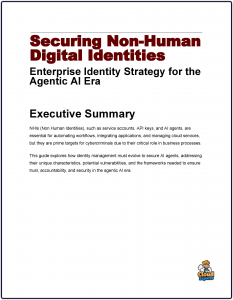Silverfort Launches ‘AI Agent Security’: The Identity Security Playbook in a Machine-Driven World
The product discovers identities used by AI agents, classifies and analyzes them, ties each AI agent to a human owner for accountability, and introduces an MCP Gateway.
 As CEO Hed Kovetz announces on Linkedin Silverfort, a leading identity security company, has launched its new product: AI Agent Security.
As CEO Hed Kovetz announces on Linkedin Silverfort, a leading identity security company, has launched its new product: AI Agent Security.
This innovation aims to secure AI agent identities by treating them as governed identities, similar to human users, to enable safe AI adoption in enterprises.
This new product protects the identities and access of AI Agents, empowering organizations to securely adopt Agentic AI by keeping agents governed, visible and protected with dedicated inline security controls that were designed specifically for AI agent.
AI Identity Security
The product discovers identities used by AI agents, classifies and analyzes them, ties each AI agent to a human owner for accountability, and introduces an MCP Gateway that can enforce granular, inline security controls to make sure each AI agent can only access what it needs to.
Key features include:
- Identity-Based Security: AI agents are tethered to human owners, creating an audit trail for accountability and visibility.
- Inline Protection: Dynamic access control policies are enforced in real-time to prevent misuse and data leakage, securing Machine-to-Machine Communication Protocol (MCP) deployments.
- Enterprise Scale: Trusted by over 1,000 organizations, Silverfort’s solution integrates with existing identity security frameworks, protecting protocols like NTLM, OpenID Connect, and MCP.
The product addresses the challenge faced by CISOs to balance rapid AI integration with robust security, mitigating risks as AI agents access corporate data stores.
Non Human Identity Risks
AI agents, designed to autonomously execute tasks or make decisions, introduce significant risks in enterprise settings, particularly as their adoption accelerates.
One major concern is unauthorized access and privilege abuse. These agents often require access to sensitive systems and data, and without robust identity governance, malicious actors could exploit them to gain unauthorized entry or escalate privileges, potentially leading to data breaches or system compromise. For instance, an AI agent with excessive credentials might be hijacked to extract confidential corporate information, highlighting the need for stringent access controls.
Another critical risk is the lack of accountability. Unlike human users, AI agents may not have clear ownership or audit trails, which complicates tracing their actions back to responsible parties. This opacity can mask malicious activities or errors, such as an AI agent executing unauthorized transactions that go undetected due to inadequate monitoring. Similarly, data leakage poses a significant threat.
AI agents interacting with multiple systems or APIs, particularly through Machine-to-Machine Communication Protocols, risk exposing sensitive data if not governed by strict access policies. An agent querying a database, for example, might inadvertently share confidential information with an unsecured endpoint.
AI agents are also vulnerable to manipulation, such as through prompt injection or adversarial inputs, which can lead to unintended behaviors that harm systems or users. A malicious actor could, for instance, alter an agent’s inputs to bypass security protocols. Additionally, traditional identity security frameworks often fail to account for AI agents, creating gaps in policy enforcement.
Without dynamic, real-time controls, agents may operate beyond their intended scope, such as accessing restricted systems during off-hours. As enterprises scale AI agent deployments, the complexity of managing their identities and interactions further amplifies the attack surface, making misconfigurations a prime target for attackers.
Finally, regulatory and compliance challenges add another layer of risk. AI agents handling sensitive data must adhere to regulations like GDPR or CCPA, and failure to secure their actions can result in significant legal and financial penalties. For example, an agent mishandling personal data could trigger non-compliance fines.
Solutions like Silverfort’s AI Agent Security aim to mitigate these risks by treating AI agents as governed identities, enforcing real-time access controls, and linking them to human owners for accountability.



